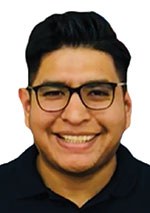Pastoral Ministry / Saul Llasca
Solid pastoral formation serves as a bridge of hope for the Church
 The synodal process is a blessing for the entire Church. It is asking for the participation of the people of God, side by side, working together. From a leadership perspective, listening sessions or encuentros (encounters) help us know and understand the people we serve.
The synodal process is a blessing for the entire Church. It is asking for the participation of the people of God, side by side, working together. From a leadership perspective, listening sessions or encuentros (encounters) help us know and understand the people we serve.
In 2018, I met a 19-year-old woman at a regional Encuentro gathering in South Bend. I was inspired by her knowledge of the faith and her understanding of life. She reminded me that we are the product of our actions, and that we are known by our fruits. After speaking with her, I wondered about her formation and how, like her, we can use that to effectively form others.
I believe that is what the Church needs, to be able to present Jesus Christ through our actions and deeds. And we need to know our faith well.
Since 2018, after observing the differences between the Church in the United States and the Church in my native Bolivia, I started realizing the Church needs more catechesis and evangelization.
However, the same question arises: how can we have better catechesis and evangelization if we do not have formation? How can I, in my position, equip other leaders in the Church if I do not provide the foundational tools for them to share Jesus Christ?
According to a 2019 Pew Research Center study, only one-third of Catholics in the U.S. understand and believe in the real presence of Christ in the Eucharist. This data was not new to the Latino community. The Encuentro Nacional de Pastoral Juvenil (National Meeting of Youth Ministry), published in 2006, stated that the Church needed “catechetical programs for young adults that explain the depth of the sacraments, especially the holy Mass, as well as the values and principles Catholics believe in so that they can grow in our faith.”
That was 16 years ago and is a clear example of prophetic voices from the periphery. In 2006, Latino young adults spoke about the importance of catechetical programs that address the realities and needs of people. These voices challenged us to be creative and develop new ways to present Christ to others. It also noted other areas where we can grow as a Church.
The document suggested “integral evangelization processes that respond to the life circumstances of Latino young people and constitute good news in the face of consumerism and individualism of the culture.”
This suggestion can lead us to the answer to the question I posed: how can I, in my position, equip other leaders in the Church if I do not provide the foundational tools for them to share Jesus Christ? We can help leaders develop formational processes to assist people in presenting Jesus Christ to others. As the 19-year-old told me, our actions and deeds are how we present God to others.
There is also a need for formation in human development in the Church. There is a need to learn again what it means to be human. We as Church are getting used to seeing others suffer. Some people have become used to having abortion clinics in their area and not defending life from conception to natural death. People have become used to seeing immigration caravans, seeing people dying in search of a better life, and many other heartwrenching issues present in society.
The document also suggests integral training and formation programs that allow young adults to assume leadership and responsibility. We need to invest in forming all of our youths and young adults to work in the Church. We also need to form them to be people of faith in their careers—Catholic doctors and nurses who can defend life, Catholic politicians who can create laws for the good of the people, Catholic lawyers who will seek justice.
The Church’s synod is leading us to a historic time, and we can no longer be just spectators. May we use that formation and the gifts we have to build up our Church.
(Saul Llasca is coordinator of the archdiocesan Office of Hispanic Ministry. E-mail him at SLlacsa@archindy.org.) †
 The synodal process is a blessing for the entire Church. It is asking for the participation of the people of God, side by side, working together. From a leadership perspective, listening sessions or encuentros (encounters) help us know and understand the people we serve.
The synodal process is a blessing for the entire Church. It is asking for the participation of the people of God, side by side, working together. From a leadership perspective, listening sessions or encuentros (encounters) help us know and understand the people we serve.